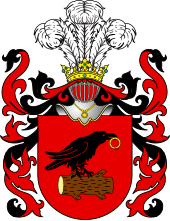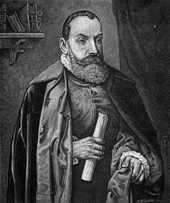Jan Kochanowski

Jan Kochanowski (* 1530 near Radom ; † August 22, 1584 in Lublin ) was one of the most important Polish poets of the 16th century.
biography
Kochanowski lived as a poet during the Polish Renaissance . He has worked in almost all genres and his creative language skills and classical perfection have opened up new dimensions for the Polish language . He was acquainted with Pierre de Ronsard and, like Nicolaus Copernicus , had studied in Italy for a long time . In addition to numerous poems, the drama The Dispatch of the Greek Envoys (Odprawa posłów greckich) and his Fraszki (= stories, short verses, satires) reminiscent of Giovanni Boccaccio and the funeral verses (Treny) are among his immortal achievements.
The son of the noble Kochanowski family, from the Korwin coat of arms (his father was a judge in Sandomierz ), began his studies in Krakow in 1544 , then went to Königsberg from 1551 to 1552 and from there to the Italian university city of Padua . He started his literary work in Italy. He wrote erotic verses in Latin here . In the mid-1550s, he also traveled to France and Germany between stays in Königsberg and Italy, and then stayed in Poland from 1559. In addition to his literary work, he was also politically active in Poland.
In 1574 he settled on the estate in Czarnolas inherited from his father . In 1575 he married Dorota Podlodowska from the Janin coat of arms , with whom he had six daughters (three of whom died in childhood) and one son. Kochanowski led the peaceful life of a landowner in Czarnolas, but was also politically active. In November 1575 he campaigned in the Sejm in Warsaw for the candidacy of Emperor Maximilian II as King of Poland.
During this time the Odprawa posłów greckich and the Psałterz Dawidów (1579), a psalter translation from the Vulgate, was created . Perhaps the most famous works by Kochanowski are the so-called Treny (1579), which were created after the death of his daughter Ursula in her memory and in mourning. In 1583 he wrote the poem Jezda do Moskwy (The Journey to Moscow), which he dedicated to the Polish-Lithuanian hetman Krzysztof Radziwiłł Piorun, in which he describes his glorious Russian campaign (1579–1582) under King Stefan Batory .
Kochanowski died unexpectedly on August 22, 1584 in Lublin. He was buried near Czarnolas, in Zwoleń.
Kochanowski's poetic work, which is particularly oriented towards Horace, had an impact on European poetry, above all through its reception by Mathias Casimir Sarbiewski , one of the most important neo-Latin poets of the Baroque era .
Works (selection)
- The concord (publ. 1564).
- The game of chess (1562–1566).
- The dispatch of the Greek envoys (1566–1568).
- David's Psalter (publ. 1579).
- Lamentations (1579–1580).
- The trip to Moscow (publ. 1583).
- Epigrams (publ. 1584).
German-language editions
- The chess game , translated and commented by Thomas Daiber. Ed. Rugerup, Berlin / Hörby 2011, ISBN 978-3-942955-03-4 .
literature
- Aleksandra Olszynka: The motif of flying in Horace (Carm. 2, 20), Kochanowski (Piesni 2, 24) and Sarbiewski (Lyr. 1, 10; 2, 5 and 4, 32). In: Eckart Schäfer (Ed.): Sarbiewski. The Polish Horace (NeoLatina 11). Narr, Tübingen 2006, pp. 83-94.
- Eckart Schäfer : Sarbiewski's patriotic poetry and his 'Polish Horace' Jan Kochanowski. In: Eckhard Schäfer (Ed.): Sarbiewski. The Polish Horace (NeoLatina 11). Narr, Tübingen 2006, pp. 145–176.
- Kochanowski, Johann . In: Meyers Konversations-Lexikon . 4th edition. Volume 9, Verlag des Bibliographisches Institut, Leipzig / Vienna 1885–1892, p. 902.
- Stanislaus Tarnowski: Jan Kochanowski . In: Catholic Encyclopedia , Volume 8, Robert Appleton Company, New York 1910.
- Jan Kochanowski. A selection from his work , Breslau 1937 (digitized version)
Web links
- Literature by and about Jan Kochanowski in the catalog of the German National Library
- Publications by and about Jan Kochanowski in VD 16 .
- Korwin coat of arms (Wappengemeinschaft Korwin ) in the English language Wikipedia
| personal data | |
|---|---|
| SURNAME | Kochanowski, Jan |
| ALTERNATIVE NAMES | Kochanowski, Johann |
| BRIEF DESCRIPTION | Polish poet |
| DATE OF BIRTH | 1530 |
| PLACE OF BIRTH | at Radom |
| DATE OF DEATH | August 22, 1584 |
| Place of death | Lublin |
